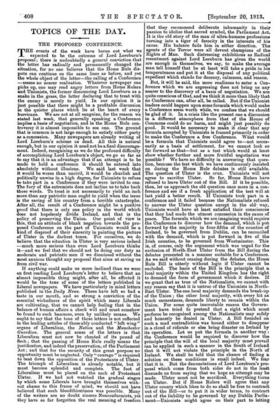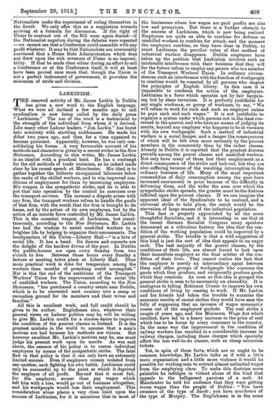TOPICS OF THE DAY.
THE PROPOSED CONFERENCE. THE events of the week have borne out what we expected to be the outcome of Lord Loreburn's proposal ; there is undoubtedly a general conviction that the letter has radically and permanently changed the situation, for no one believes that the Home Rule dis- pute can continue on the same lines as before, and yet the whole object of the letterāthe calling of a Conference āseems no nearer realisation. Whatever newspaper one picks up, one may read angry letters from Home Rulers and Unionists, the former denouncing Lord Loreburn as a snake in the grass, the latter declaring that to treat with the enemy is merely to yield. In our opinion it is just possible that there might be a profitable discussion in the quieter places which lie at the heart of every hurricane. We are not at all sanguine, for the reason we stated last week, that generally speaking a Conference implies a basis of negotiation, and in the Home Rule con- troversy it is almost impossible to see one. The ground that is common is not large enough to satisfy either party as a concession. Many newspapers are already writing of Lord Loreburn's scheme as dead. All this is natural enough, but in our opinion it need not be a final discourage- ment. Indeed, recognizing as we do the profound difficulty of accomplishing Lord Loreburn's object, we go so far as to say that it is an advantage that if an attempt is to be made to hold a conference it should be entered into absolutely without illusions. We said last week that it would be worse than uncivil, it would be churlish and politically unwise in a high degree, for Unionists to refuse to take part in a Conference if they were invited to one. The fury of the extremists does not incline us to take back those words. To treat is not necessarily to yield an inch more than any patriotic man ought to yield when the issue is the saving of his country from a terrible catastrophe. After all, the result of a Conference might be a positive proof that there is only one policy in the world which does not hopelessly divide Ireland, and that is the policy of preserving the Union. Our point of view is this, that an attitude of blank negation towards the pro- posed Conference on the part of Unionists would be a kind of disproof of their sincerity in painting the picture of Ulster in the darkest tones. For ourselves, we do believe that the situation in Ulster is very serious indeed āmuch more serious than even Lord Loreburn thinks itāand we feel that we should not be doing our duty as moderate and patriotic men if we dismissed without the most anxious thought any proposal that aims at saving us from civil war.
If anything could make us more inclined than we were on first reading Lord Loreburn's letter to believe that an almost impossible thing might, after all, be effected it would be the tone of some of the letters published in Liberal newspapers. We have particularly in mind letters published in the Daily News. These have left so bad a taste in our mouth, and so strong a conviction of the essential wickedness of the spirit which many Liberals are cultivating, that we cannot help feeling that in the balance of human affairs a check will and must somehow be found to such baseness, even by unlikely means. We ought to say that the tone of these letters is not reflected in the leading articles of those ably conducted "left wing" organs of Liberalism, the Nation and the Manchester Guardian. The general sense of the letters is that Liberalism must not now be cheated of its pound of flesh ; that the passing of Home Rule really means the justification, and indeed the preservation, of the Parliament Act ; and that for the security of this great purpose no opportunity must be neglected. Only " courage " is required to beat down the opposition of the Protestants of Ulster. The triumph of Liberalism is already notable, but it must become splendid and complete. The foot of Liberalism must be placed on the neck of Protestant Ulster. If we had not watched the gradual stages by which some Liberals have brought themselves with- out shame to this frame of mind, we should not have believed that such bloodthirstiness was possible. Many of the writers are no doubt sincere Nonconformists, yet they have so far forgotten the real meaning of freedom that they recommend deliberate inhumanity in their passion to idolize that sacred symbol, the Parliament Act. It is the old story of the man of ultra-humane professions turning into a tiger of ferocity in the interests of his cause. His balance fails him in either direction. The agents of the Terror were all devout champions of the Rights of Man. Such distressing exhibitions as Radical resentment against Lord Loreburn has given the world are enough in themselves, we say, to make the average man tell himself that he at least will take a pride in his temperateness and put it at the disposal of any political expedient which stands for decency, calmness, and reason.
But, it will be said, the mere readiness to enter a Con- ference which we are expressing does not bring us any nearer to the discovery of a basis of negotiation. We are quite conscious of that, and we think it more than likely that no Conference can, after all, be called. But if the Unionist leaders could happen upon some formula which would make a Conference seem worth while, we confess that we should be glad of it. In a crisis like the present one a discussion in a different atmosphere from that of the House of Commons could do no harm, and might just possibly do good. It would be necessary to make it clear that any formula accepted by Unionists is framed primarily in order to make the Conference a free Conference. What would be a formula that Unionists could agree toānot neces- sarily as a basis of settlement, for we cannot look so far forward as thatābut as a test which would at least show whether further and more fruitful negotiation was possible ? We have no difficulty in answering that ques- tion, because the test which we have continuously insisted on during the Home Rule debates is still available. The question of Ulster is the crux. Unionists will not agree to sacrifice Ulster. So far, Home Rulers have refused to leave Ulster out of the Bill. If it be possible, then, let us approach the old question once more in a con- ference and see if a fresh application of the test will at last yield a better result. If Unionists took part in a. conference and it failed because the Nationalists refused to answer the Ulster question except in the oldā¢ way, Unionists would have at least satisfied their consciences that they bad made the utmost concession in the cause of peace. The formula which we are imagining would require the Conference to discover how the demand, which is put forward by the majority in four-fifths of the counties of Ireland, to be governed from Dublin, can be reconciled with the demand, which is put forward in five of the Irish counties, to be governed from Westminster. This is, of course, only the argument which was urged for the exclusion of North-East Ulster from the Bill during the debates presented in a manner suitable for a Conference. As we said without ceasing during the debates, the Home Rule Bill is utterly without logic if Ulster cannot be excluded. The basis of the Bill is the principle that a local majority within the United Kingdom has the right to demand the form of government which it desires. If we grant that as true of the Nationalists, we cannot with any reason say that it is untrue of the Unionists in North- East Ulster. The one local majority demands the break-up of the Union ; the other local majority, with every bit as much earnestness, demands liberty to remain within the Union. For some quite inscrutable reason the Govern- ment have tried to pretend that a right which must perforce be recognized among the Nationalists may safely and honestly be denied in Ulster. A Bill founded on such a mad contradiction was bound either to disappear in a cloud of ridicule or else bring disaster on Ireland by its operation. Let us put the formula in another way : the Conference would be required to discover how the principle that the will of the local majority must prevail can be applied in such a manner in the South of Ireland that it will not violate the principle in the North of Ireland. We shall be told that the chance of finding a solution on these conditions is small indeed. We fear that it is. But the denunciations of Lord Loreburn's pro- posal which come from both sides do not in the leak dissuade us from saying that we hope an attempt may be made. Ulster must not be sacrificed. Everything turns on Ulster. But if Home Rulers will agree that any Ulster county which likes to do so shall be free to contract out of the Billāor to put it in wider terms, to contract out of the liability to be governed by any Dublin Parlia- mentāUnionists might agree on their part to letting Nationalists make the experiment of ruling themselves in the South. We only offer this as a suggestion towards arriving at a formula for discussion. If the right of Ulster to contract out of the Bill were again deniedāif the Nationalist negation during the debates were repeated āwe cannot see that a Conference could assemble with any profit whatever. It may be that Nationalists are irrevocably convinced that a Home Rule Administration which does not draw upon the rich revenues of Ulster is an impossi- bility. If that be made clear either during an effort to call a Conference or at the Conference itself, it will at least have been proved once more that, though the Union is not a perfect instrument of government, it provokes the minimum of strife and division.











































 Previous page
Previous page